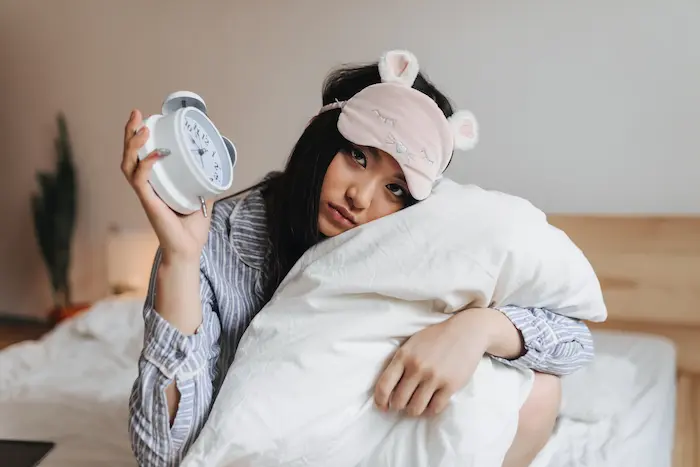Sleep Disorders: Symptoms, Causes and Treatment
It is no secret that sleep is undoubtedly one of life’s pleasures. A good night’s rest ensures that you are energetic and more proactive during the day. It literally keeps us more awake and healthy. However, some people suffer from sleep disorders which can lead to problems with concentration, vitality and overall health. If you can’t sleep or feel like you have sleep problems, read on.
Sleep disorders are problems related to sleeping poorly or basically or not being able to sleep. In general, when we talk about them, we refer to a set of alterations that occur when we sleep, that is, in the phases of sleep, interrupting rest and causing it to be inadequate, continuous and restorative.
You have to keep in mind that there are many types of sleep disorders which basically manifest themselves as follows:
- Problems falling asleep and staying asleep.
- Problems waking up or staying awake, i.e. continuous drowsiness.
- Problems maintaining normal sleep hygiene, i.e., regular sleep schedules.
- Sleeping poorly, waking up several times or adopting strange behaviors while sleeping, such as crying, talking in your sleep, jumping up and down or sleepwalking, among others.
Most common types of sleep disorders
Have you ever felt that as soon as you wake up you feel as if you haven’t slept all night, that is, you feel just as tired as you did when you went to bed? Be alert, because these are signs of sleep disorders, here are some of the main symptoms and most frequent types of disorders.
- Insomnia: When you cannot sleep or maintain a quality of sleep adequate to your physical rest.
- Narcolepsy: It is the difficulty to stay awake for long periods of time, which makes it impossible to lead a normal life.
- Sleep apnea: If you are one of those who constantly snore, interrupting the sleep of others or even your own (if you wake up with your own snoring) and if this causes you to stop breathing for some periods of time, producing apnea, you are suffering from sleep disorders.
- Restless legs syndrome: If you can’t stop moving your legs or if you feel them shaking constantly.
- Parasomnias: The abnormal interruption of sleep, for example, you start walking, having nightmares, convulsions or talking in your sleep, clearly another warning sign.
- Sleepwalking: When a person wakes up while asleep and acts unconsciously during sleep, without remembering what he/she does once awake, it is sleepwalking and is a sleep disorder.
- Hypersomnia: It is the excessive ease of falling asleep during the day in situations that do not happen to most people, for example, while driving.
Causes of sleep disorders
Sleep disorders can have several causes, some of which can be physical or psychological, for example:
Sleep disorders can have several causes, some of which can be physical or psychological, for example:
Sleep disorders can have several causes, some of which can be physical or psychological, for example:
- Anxiety
- Depression
- Thyroid problems
- Migraine problems
- Obesity: this can also alter sleep, but lack of sleep also helps to cause obesity, hence the importance of sleeping well if you want to lose weight.
It should be taken into account that these disorders bring with them other problems such as burnout and low academic, professional and personal performance.
Symptoms of sleep disorders
In addition to what we have already mentioned, some general symptoms that occur due to lack of sleep or poor sleep are:
Physical exhaustion
No matter how much sleep you get, you feel constantly tired. You don’t feel like doing anything the next day because you always feel that you should rest more, sometimes your body may ache or you may have continuous headaches.
Low performance
No matter how hard you try, you do not perform in any activity you consider, that is to say, there is mental exhaustion, you cannot concentrate well and when the work requires mental effort it becomes heavy, you feel sluggish when thinking or acting.
Daytime sleep
If you constantly feel sleepy during the day, fall asleep easily when you are sitting down to rest, or if you simply lie down for a nap, you may sleep for hours on end, you may have sleep disorders
Difficulty in fulfilling your obligations
If you feel so sleepy and tired that you find it difficult to get up early to work, study or play sports, or if more than once you have had to cancel a commitment because you feel sleepy or tired, it is time to look for a solution because this is a derivative of sleep disorders.
These disorders are treatable, although you must be consistent, usually with the right actions this can improve.
Some recommendations are:
- Avoid caffeine in the evening, or consuming too much during the day.
- Avoid or reduce tobacco consumption
- It is recommended that you only go to bed when you are ready to sleep, that is, avoid being there reading, watching your cell phone, TV or in the worst case, eating. Go to bed to sleep and prepare everything for it, light, air or ventilation and blankets or sheets. It is necessary that you feel comfortable and that the space is appropriate for this.
- Avoid eating a late dinner or heavy meals.
- Eat well.
- Set certain times to go to sleep and other times to get up, both during the week and on weekends.
Existing treatments
There are several treatments for sleep disorders, depending on the type of disorder and its underlying cause. Some of the most common treatments include:
Cognitive-behavioral therapy (CBT)
This therapeutic approach focuses on changing patterns of thinking and behavior that may be contributing to the sleep disorder. CBT may include techniques such as progressive muscle relaxation and sleep restriction.
Medications
There are several types of medications that can help treat sleep disorders, such as hypnotics (sedatives) and antidepressants. These medications must be prescribed by a physician and should be taken as directed.
Light therapy
Light therapy is often used to treat seasonal affective disorder (SAD), a type of depression that is related to seasonal changes in daylight.Light therapy involves sitting in front of a bright light box for a certain period of time each day.
Lifestyle modifications
Making lifestyle changes can be helpful in improving sleep. These changes may include establishing a regular bedtime and wake-up routine, avoiding caffeine and alcohol before bedtime, and exercising regularly.
Breathing therapy
Breathing therapy can be used to treat sleep apnea, a disorder in which breathing stops briefly during sleep. Breathing therapy involves the use of a machine to provide continuous positive airway pressure during the night.
Natural supplements for sleep disorders
First of all, we recommend you to try a natural method, since many times, the cause may be due to a temporary situation.
Melatonin
Influences the sleep-wake cycle, the natural levels of melatonin in the blood are higher at night, so some studies suggest that its intake helps to improve sleep problems
Magnesium
This mineral helps the processes of energy production in the body from food, blood glucose control and blood pressure, so if you consume it you can gain energy needed for daily activities.
Poppy powder
It is very positive for better sleep, as it helps to calm anxiety and irritability.
Lavender
A few drops of lavender oil in your hand or on your pillow before going to sleep will help you fall asleep thanks to its relaxing effect
Valerian
This plant has essential oils with relaxing and sedative effects, it reduces nervousness and agitation, which helps to sleep better.
There is a natural, complete and highly recommended supplement, Anafi Good Night Caps by Neeo Cure that comes in a presentation of 60 natural sleeping pills. It is of natural origin, made from plants and melatonin that help you sleep better and have a restful rest. If you feel tired and can’t sleep well, this may be the solution.
There is also the Duo Pack Relax, with Good night and Stress Relief capsules, a vegan pack that helps reduce stress and promotes a state of well-being, calmness and concentration, helping to improve performance and a more restful and deep sleep, which improves your balance in all aspects.
Conclusion
Don’t forget that sleep disorders can be prevented, improved and even disappear with the right actions and treatment. Remember that sleep does not wait, it is essential for good health and a more energetic and happy life.



